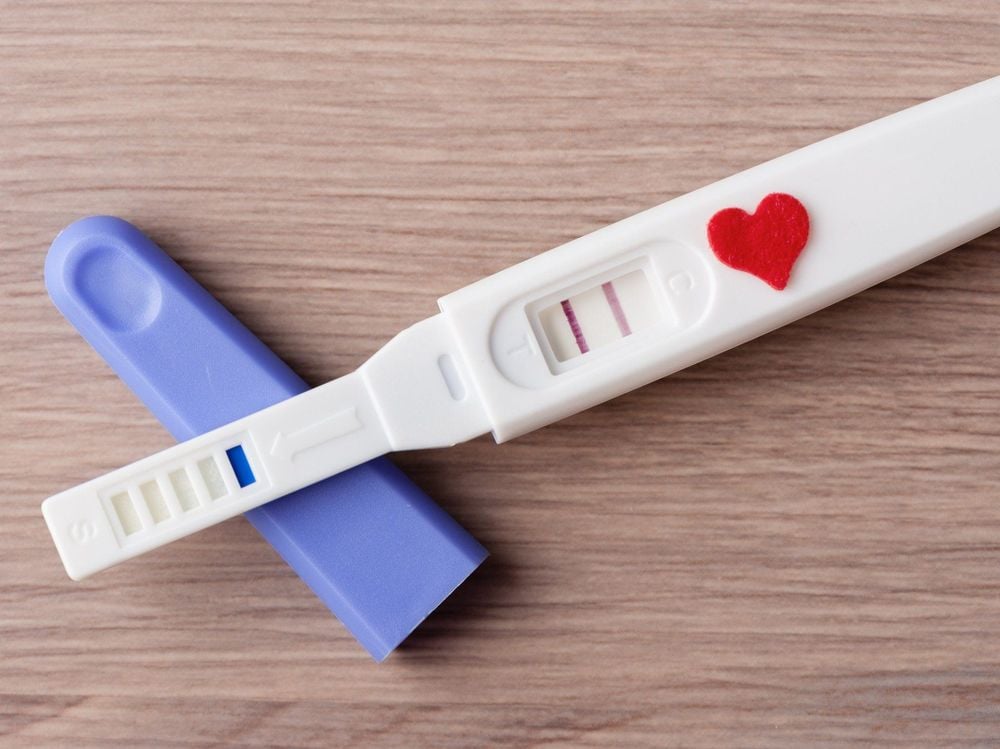This is an automatically translated article.
False pregnancy is a condition in which you believe you are pregnant and may have symptoms similar to pregnancy but there is not really any fetus here. People who have a false pregnancy will most likely have pregnancy symptoms such as missed periods, weight gain, nausea and back pain. This article will provide information about false pregnancy in women.
1. What is a false pregnancy?
Pregnancy is often an exciting time for parents-to-be. But pregnancy does not always end with the expected baby. In rare cases, a woman (or even a man) believes she is pregnant, only to find out that her symptoms are not due to pregnancy but to a cause. any other. When a woman is pregnant, usually you can easily notice that there are pregnancy symptoms such as nausea, fatigue, breast tenderness.... But in some special cases, these symptoms These symptoms are not signs of pregnancy.
A false pregnancy is also known as a “phantom” pregnancy, or in clinical terms, pseudocyesis. The concept of false pregnancy is nothing new. Hippocrates, the father of medicine, made the first written record of this phenomenon in 300 BC.

It is an uncommon condition, in which case there is some reason why a woman believes she is pregnant. She will even have many typical symptoms of pregnancy like missed period, nausea, fatigue, abdominal pain.
But all these symptoms have nothing to do with pregnancy. In a false pregnancy, there is no conception and no baby. Even so, symptoms can last long enough to make a woman and those around her believe she is pregnant.
Cases of false pregnancy have decreased significantly in the United States over the past century. In the 1940s, about 1 in 250 false pregnancies occurred. This number has dropped to between 1 and 6 cases for every 22,000 births.
The average age of a woman experiencing a false pregnancy is 33. But there have been cases reported in children under 6 years old and in women 79 years old. About one-third of women with false pregnancies have been pregnant at least once, and more than two-thirds have been married. Women with a history of sexual abuse may be at higher risk of a false pregnancy.
In countries with easy access to accurate pregnancy tests, false pregnancies have become quite rare. Some cultures that value a woman's fertility have a much higher rate of false pregnancy than the rest of the world.
Trắc nghiệm: Bạn có hiểu đúng về dấu hiệu mang thai sớm?
Các dấu hiệu mang thai sớm không phải chỉ mỗi trễ kinh mà còn có rất nhiều dấu hiệu khác như xuất huyết âm đạo, ngực căng tức,… Điểm xem bạn biết được bao nhiêu dấu hiệu mang thai sớm thông qua bài trắc nghiệm này nhé!
2. Causes of false pregnancy?
At the present time, there is no answer to why some women experience false pregnancy. But there are three top theories. Some mental health professionals believe that pseudopregnancy is related to an intense desire to get pregnant or to the opposite psychological problem of fear of pregnancy in some women. It is possible that this affects the endocrine system, thereby causing pregnancy-like symptoms.

Another theory concerns the satisfaction of women's own desires. Some mental health professionals believe that when a woman longs to get pregnant, be it after multiple miscarriages, infertility or because she wants to get married, she can be sensitive and easily mistaken for changes. certain on the body as a clear sign that she is pregnant.
A third hypothesis involves certain chemical changes in the nervous system that are associated with depressive disorders. It is possible that these chemical changes are responsible for the symptoms of false pregnancy.
Only recently have doctors begun to understand the psychological and physical problems at the root of false pregnancy. Although the exact cause is unknown, doctors suspect that psychological factors may trick the body into "thinking" that you are pregnant.
When a woman feels an intense desire to get pregnant, be it due to infertility, repeated miscarriages, approaching menopause or a desire to get married, her body can produce several pregnancy signs (such as an enlarged belly, enlarged breasts, and even the feeling of fetal movement). The woman's brain then misinterprets those signals as pregnancy and triggers the release of hormones (such as estrogen and prolactin) that lead to actual pregnancy symptoms.
Some researchers have suggested that poverty, lack of education, childhood sexual abuse or relationship problems may play a role in causing false pregnancies. Pseudopregnancy is not the same as “faking pregnancy” for gain (eg, for financial gain), or delusions about pregnancy (eg, in patients with schizophrenia).
3. What are the symptoms of a false pregnancy?
False pregnancy often resembles pregnancy in every way, except for the presence of the baby. In any case, the woman is completely convinced that she is pregnant.

Physically, the most common symptom is a distended abdomen, similar to the growth of a baby in the womb during normal pregnancies. The abdomen may begin to enlarge like it does during pregnancy when the fetus is growing. In a false pregnancy, this dilated abdomen is not due to the presence of a fetus. Instead, this symptom could be o a build-up of:
Abdominal Fat Stool Stagnation Urine Stagnation Irregular menstrual cycles are the second most common physical symptom. About half to three-quarters of women with a false pregnancy report feeling the baby move. Many women also report feeling the baby pounding, despite never having had a baby.
Other symptoms that can be difficult to distinguish from those of actual pregnancy, may include:
Morning sickness and vomiting Breasts become tender Changes to breasts, including size and color lactation Weight gain Abdominal pain Appetite Increase in size of uterus Soft cervix False labor These symptoms can be so obvious that doctors can even confuse them. These symptoms can last for just a few weeks, for 9 months, or even for several years. A very small percentage of patients with a false pregnancy will come to the doctor's office or hospital with what feels like labor.

4. Check false pregnancy status
To determine if a woman has a false pregnancy, a doctor will usually evaluate her symptoms, perform a pelvic exam, and an abdominal ultrasound - the same tests used to feel and Visualize the fetus in a normal pregnancy.
In the case of a false pregnancy, the ultrasound will not see the baby and will not show any signs of the fetus. Sometimes, however, your doctor will find some physical changes that occur during pregnancy, such as an enlarged uterus and a tender cervix. One of the important tests to distinguish between false pregnancy or not is the BhCG (beta human chorionic gonadotropin) pregnancy hormone test. This test can be done simply through a pregnancy test. A urine hCG test (pregnancy strip) will always give a negative result in these cases. However, some special situations such as rare cases of cancers that produce the hormone hCG similar to pregnancy will give a positive result (2 bars).
Some medical conditions can mimic the symptoms of pregnancy, including ectopic pregnancy, obesity, and cancer. These problems may need to be ruled out with more specialized tests.
5. Treatment of false pregnancy
It is very rare to encounter false pregnancy. The symptoms of true pregnancy and false pregnancy can be confusingly similar, but there is one significant difference. In a false pregnancy, there is simply no baby.

Treatment of a false pregnancy is not a difficult treatment, it is important to show a woman proof that she is indeed not pregnant through imaging techniques such as ultrasound. This is one of the most successful treatments to end a false pregnancy.
False pregnancy is not believed to have a direct physical cause, so there are no general recommendations for drug treatment. But if a woman is experiencing symptoms such as irregular periods, her doctor may prescribe them to correct these disorders.
False pregnancy seems to occur more in women with psychological instability. For that reason, they should be under the care of a psychotherapist for treatment.
When a woman believes she is pregnant, especially over a period of several months, she can be very sad to learn that she is not pregnant. Physicians need gentle communication, and psychological support, including therapy, to help patients with pseudopregnancy recover from this great disappointment.
Periodic health check-ups help to detect diseases early, so that there are treatment plans for optimal results. Currently, Vinmec International General Hospital has general health checkup packages suitable for each age, gender and individual needs of customers with a reasonable price policy.
Results of the patient's examination will be returned to the home. After receiving the results of the general health examination, if you detect diseases that require intensive examination and treatment, you can use services from other specialties at the Hospital with quality treatment and services. outstanding customer service.
Please dial HOTLINE for more information or register for an appointment HERE. Download MyVinmec app to make appointments faster and to manage your bookings easily.
Reference source: healthline.com; webmd.com













